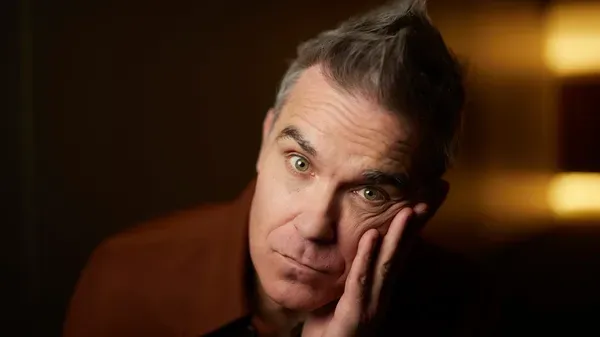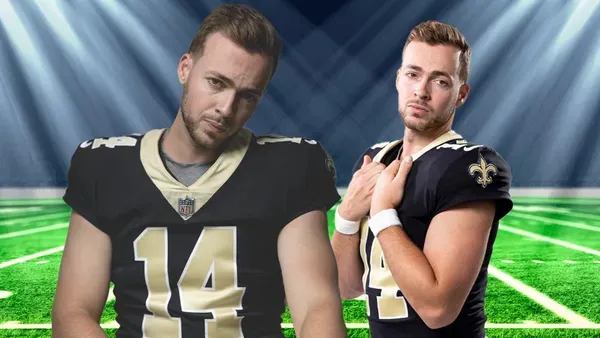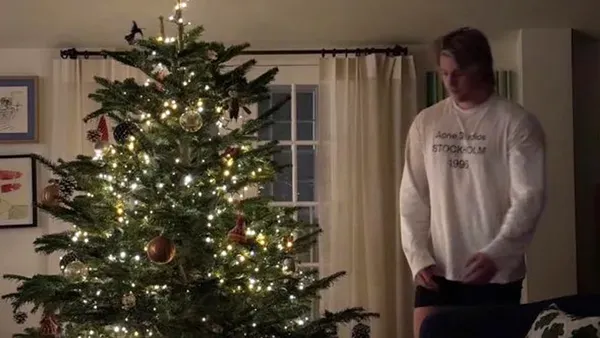August 26, 2016
Text, Subtext, and Epic Violence :: John Kuntz on Directing 'Blasted'
Kilian Melloy READ TIME: 9 MIN.
There are certain plays that elicit strong, harsh disapproval upon their first presentation to the world. Think of the infamous "Ubu Roi," the Alfred Jarry play that had one performance in Paris in 1896 and sparked a riot.
Sarah Kane's "Blasted" didn't cause a riot, but it did draw a flurry of scathing criticism upon its London premiere in 1995. The play centers around three characters: A journalist named Ian; a young woman named Cate; and an unnamed soldier. Episodes of sexual assault and violence ensue, along with maiming, suicide, implied prostitution, and the devouring of a baby. The hotel room is struck by an explosive shell at one point. The world seems to be at war... or is it that the war in question is raging within the context of the social and psychological world we share?
Kane went on to author five plays in all before her suicide, in 1999, at the age of 28. "Blasted" was her first work, and it remains her most famous. With the perspective of time, the theater world has come to recognize Kane as an influential writer, and "Blasted" as an important contribution.
"Blasted" has never had a Boston premiere – until now, that is. Off the Grid Theatre Company is bringing the play to the Boston Center for the Arts, under the direction of John Kuntz, a celebrated playwright in his own respect (author of "American Muskrat," "The Hotel Nepenthe," "The Salt Girl," and numerous others) and the star of any number of critically-acclaimed productions, including "Copenhagen," "The Whale," Taylor Mac's "The Lily's Revenge," and – just this past spring – the Rated-M-For-Mature "Bootycandy," where Kuntz co-starred with Maurice Emmanuel Parent, Tiffany Nichole Greene, and Johnny Lee Davenport. Kuntz also played Salvador Dali in the Nora Company's production of "Hysteria," a role that (as we shall see below) has come in handy for his more recent creative endeavors.
Off the Grid has been creating theater in Boston since 2012, and is now entering its fifth season. Its past productions include "Equuus" (2015) and entries on the Boston Theater Marathon, as well as productions of "Dog Sees God" (2013) and "Romeo & Juliet" (2014). Off the Grid plans on a mere ten performances for "Blasted," which might just make this the hottest ticket in town. In any case, the production comes with a warning label: As stated at the Off the Grid website, "This play contains graphic scenes of physical and sexual violence and nudity. Not intended for audience members under age 17."
Leave your kids at home for this one, Boston theatergoers!
EDGE caught up for a chat with John Kuntz about the play, its troubled past, and its bright... or dark... future.
EDGE: This play generated quite a lot of controversy when it was first performed in England, but now it's seen as an important work. What's changed?
John Kuntz: I think, at the time, many people were quite shocked by "Blasted" and didn't know what to make of it. I think the initial reaction was outrage; one critic actually called it a "feast of filth." It reminded me a bit of the initial reaction people had to "Waiting for Godot."
"Blasted" is, admittedly, a wildly violent, brutal and disturbing piece. But there is a beauty and poetry and dark humor there, as well. The play seems to be trying to blast the world apart at its seams. Over 20 years later, everything's changed, and nothing's changed, and the play feels so sadly and urgently relevant to our world today.
This play didn't just fade away after its initial production. Something really resonated with people. I think Sarah Kane captured something in this play that's very truthful and scary and profound. The randomness of violence, for example, that was true when she first wrote it (and feels even more true for us now, especially in our country with its lax gun laws) and the idea that violence could just suddenly break out, the way it does in the play... that everything can really explode and be blasted apart in a moment. That's something we don't like to think about, but Kane not only thought about it, she hunkered right down in there and brought up this play.
Yet even though "Blasted" managed to become a rather famous (and notorious) play over the years, I don't think it has never been performed here in Boston (except - I believe - for college productions). So I'm very excited to share it with audiences here and hopefully they'll be excited, too!
EDGE: Textually and symbolically, it seems there are a lot of things the playwright is thinking about that seem quite disturbing, but they do require us to take a step back and think about them - for instance, the relationship between perpetrators of violence and their victims, or the idea that, as a species, we eat our young.
John Kuntz: It can be quite a scary place to work and live in, Sarah Kane's world. I've never read a play quite like "Blasted," and I have always been rather inspired by it, because I thought Sarah Kane was incredibly brave, that she was trying to capture something so difficult and so dark and so true. The violence in the play is quite specific and, despite its excess, believable. I feel like she was riffing on "King Lear," on Pinter and Beckett, but she's really made her own world with "Blasted."
EDGE: And as you mentioned, she did end up committing suicide. I wonder if the play's content and style relates directly back to the causes for that.
John Kuntz: I think that it does. There's an interesting essay I read about her work, that explored the five plays she wrote and sees them as a journey inward towards the self. Her plays seem to get smaller and smaller, and by that I mean they get more personal and more insular, until her last play, "4.48 Psychosis," which is literally set inside the lone character's mind and feels almost autobiographical. Sarah Kane had terrible insomnia and anxiety attacks, and 4:48 am was the time of morning when she'd always wake up. So her writing feels like it goes from the outside in; she just kept going more and more inward, pinpointing and focusing until she finally just got right into herself.
EDGE: So she's spiraling, in way, with her plays?
John Kuntz: Yeah, in a way, or funneling, almost? In "Blasted," it seems that a single act of personal violence can echo out into the universal, into the world. The idea is that there's no such thing as a small act of violence. Violence against a single person affects the whole world. When one character in this play rapes another, it causes the whole world to explode. Similarly, when we treat each other with kindness, that echoes out into the world as well. I feel like that's one of the things the play is trying to say.
EDGE: It's interesting that this play is a three-hander, and it's set in a single location, in a hotel room, which seems to me – as you're pointing out – that to deal with these subjects, you need to have a very small area, and a small cast. With a big cast, I don't know that it would work.
John Kuntz: Maybe that's a reason why this play is produced more than some of her other ones. There's something about the containment of it, and also the challenges of the play. I had always assumed that this play wasn't done often because the violence is so graphic and people are frightened to do it. But also, technically... when I first looked as the script, as a director, I thought, "How do we do some of these effects?" Like, how do you make a hotel room explode? It could be a literal explosion, but it's also an abstract explosion. I've never seen a production of this play, by the way. Maybe that's a good thing.
There are other things, as well, that feel surreal. Time especially starts to feel really weird. Kane describes rain between each scene, a "spring rain," a "summer rain," a "fall rain," and a "winter rain." We get the sense that time is passing rapidly, again like "Godot," where the sun suddenly sets, and the moon just pops up.
EDGE: How did this play come to be chosen as a production for Off the Grid?
John Kuntz: The artistic director of Off The Grid, Alexis Scheer, chose this play. She was talking with Chris Webb and they were batting ideas around. The two of them had just worked together on "Equus" with Steve Barkhimer [when off the Grid produced that play in 2015; Scheer was part of the cast, and Webb directed]. It was a lovely, pared-down "Equus."
Anyway, they were just talking, and they said, "Well, what do we do next?" and "Blasted" just came up, and they were both quite excited by it and approached me about directing it, with both of them in the cast.
Chris is a colleague of mine at Boston Conservatory, and I've also acted with Chris; and Alexis is one of my former students, so I know both of them pretty well. Alexis also played Connie in my play "The Annotated History of the American Muskrat."
At the time they approached me, I was deep into the run of "Bootycandy" [for SpeakEasy Stage Company], which starred the lovely Maurice Parent, and I asked him if he would be interested in playing The Soldier. He said yes, which I am very thrilled about. I'm still reeling at this amazing cast. Everyone is taking such great care of each other, which is what you need in a brutal world like this one in "Blasted."
EDGE You are well-known in the Boston theater scene as a writer in your own respect, as well as an actor and director. What have you got in the hopper as far as new writing projects?
John Kuntz: Oh, I'm always writing plays! I have three plays that are just rarin' to go! If you know anyone who wants to produce a weird strange play, send 'em my way!
[Laughter]
Right now I'm devising a show with my husband, Tommy Derrah, about a shrew. And by "shrew," I mean the actual rodent, which will – I hope! – be played by Tommy. It's a song cycle about a little shrew who lives in a box with a bunch of power tools and rope, and she comes out of the box and sings songs, and then she goes back in her box again. Tommy has written the songs; there are over 100 now, and they are each about thirty seconds long. The idea is that the box opens, this shrew comes out, and she sings all these songs in sequence. Then she goes back in her box again. There's tons of props and costumes.
Now that I'm saying this to you, I realize it's rather, uhh, hard to describe...
[Laughter]
It seems very clear to me!
EDGE: I can totally see Tommy in that role. It seems perfect for him.
John Kuntz: I think so! We're pretty connected with the shrew idea. That's what we do with our down time. We sit on the couch and come up with songs.
Another play I'm currently working on is a play about Hitchcock and Salvador Dali, using the surrealism of Dali's paintings and mashing it into Hitchcock's suspenseful filmic worlds – I got the idea after watching the film, "Spellbound." I thought: "Oh, these two men worked together? Amazing." I'm going to try to create that with my students this fall, and hopefully I'll have a play by February. I think it will be a world of dreams and memory and shower curtains and lots and lots of Post-It notes. And cabbage.
[Laugher]
I'm also directing "Red Noses" at the Boston Conservatory. It's the first time I've directed there since"The Balcony."
EDGE: You know, I meant to mention, as soon as I heard you were directing "Blasted" I thought about "The Balcony." I thought you were the perfect person to direct the play.
John Kuntz: Oh, well thank you! I'm psyched.
"Red Noses" is a gigantic play about clowns during the black plague. It came out in the '80s - it was kind of an AIDS metaphor. It's about a band of clowns that goes around making people laugh during the black plague. A really interesting play. It's the opposite of "Blasted," in some ways.
"Blasted" will run Sept. 2 - 18 at the Boston Center for the Arts. For more information, please go to www.offthegridtheatre.com
For tickets, please go to www.bostontheatrescene.com or call the BostonTheatreScene box office at 617-933-8600. Tickets may also be purchased in person at the Calder Pavilion at the BCA, 527 Tremont Street in Boston, or at the BU Theatre, 264 Huntington Ave., in Boston.
Kilian Melloy serves as EDGE Media Network's Associate Arts Editor and Staff Contributor. His professional memberships include the National Lesbian & Gay Journalists Association, the Boston Online Film Critics Association, The Gay and Lesbian Entertainment Critics Association, and the Boston Theater Critics Association's Elliot Norton Awards Committee.





